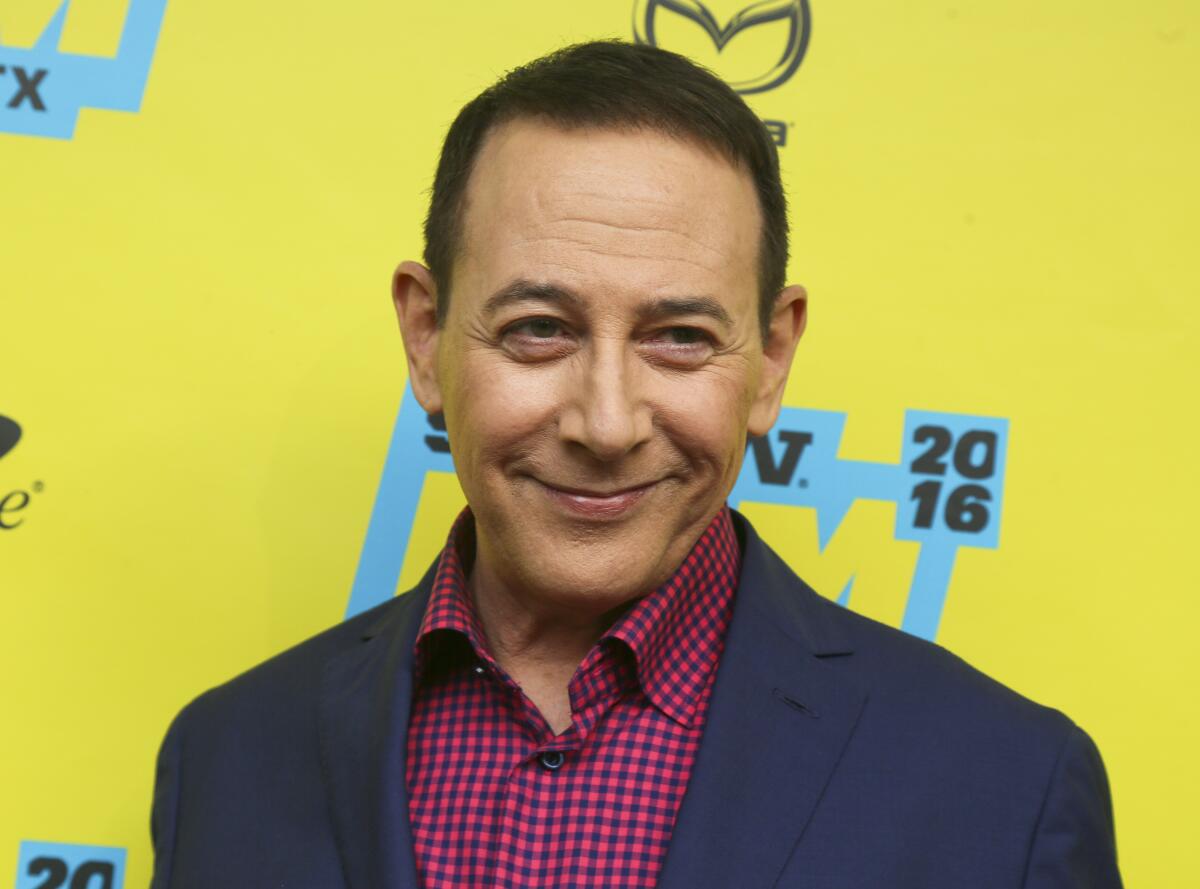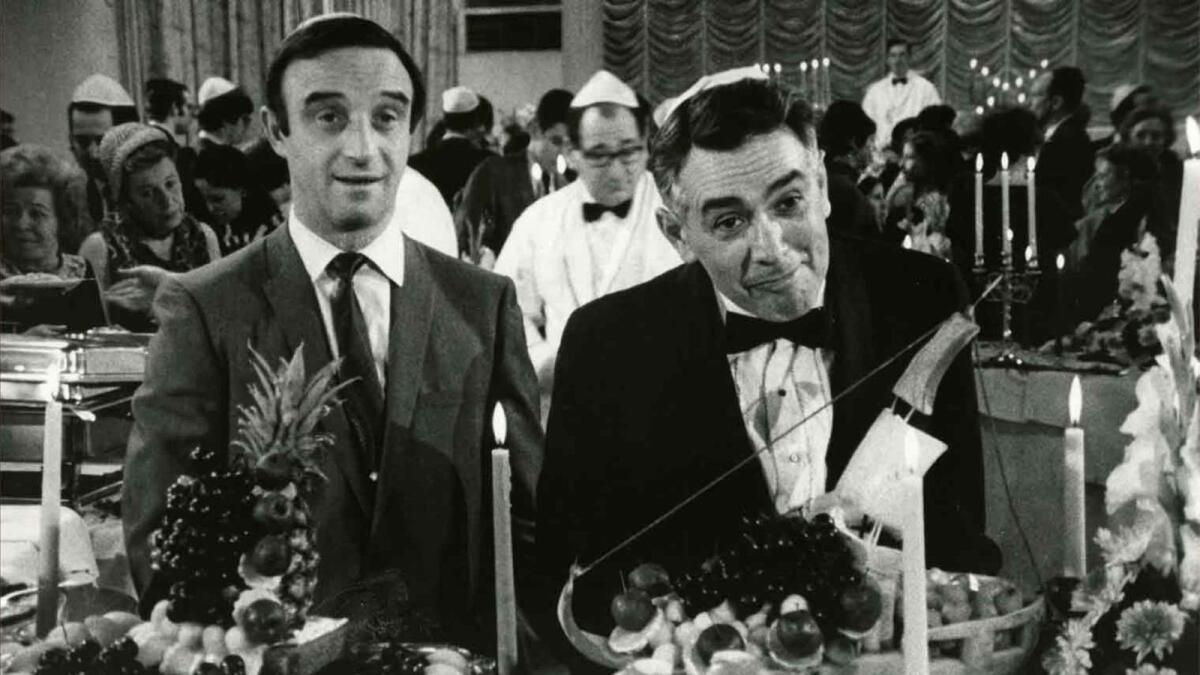Tributes to Paul Reubens and William Friedkin, plus the best movies to see in L.A. this week

- Share via
Hello! I’m Mark Olsen. Welcome to another edition of your regular field guide to a world of Only Good Movies.
Let the festivals begin The fall movie season started this week with the launch of the Telluride and Venice film festivals. Glenn Whipp took a look at Telluride, where among the premieres there are Emerald Fennell’s “Saltburn,” Alexander Payne’s “The Holdovers,” George C. Wolfe’s “Rustin” and Andrew Haigh’s “All of Us Strangers.”
This is the first edition of that festival since the deaths of two of its founders, Bill Pence and Tom Luddy.
Festival director Julie Huntsinger said of Luddy, “Tom had this preternatural equanimity. He wanted everyone to love cinema as much as he did. And for that love to be contagious, he knew he had to talk about it in a certain way — which was his natural way. He could make people enthusiastic for really academic cinema and movies from bygone eras. And they’d always say, ‘How have we never seen that? That’s so fantastic.’ It was just a combination of good taste, kindness and charisma.”
I’ll be part of the team heading to the Toronto International Film Festival next week. In advance, I took a look at how the ongoing Hollywood strikes are affecting the festivals in Venice, Telluride, Toronto and New York.
Though it seems that more stars will be on red carpets than initially expected (thanks to SAG-AFTRA’s policy of allowing actors to promote projects that have signed an interim agreement with the guild), in some ways the strikes have caused the festivals to get back to basics and focus on the films themselves.
As Dennis Lim, artistic director of the New York Film Festival said, “The event is what happens in the cinema, between the audience and the film and ideally the filmmaker and the people who made the film. I think that can take so many forms. The filmmaker could be present or not, but I feel the event begins and ends with what’s on screen. Contextualizing the film is important, having discussions about the film is important. Having the people who worked on the film present to talk about that is important. But what is most important to me is the film.”
Fall preview This weekend, our annual fall preview will be in print, but the stories are already online. Many LAT writers contributed to a list of the 20 movies they are particularly excited about, from Hayao Miyazaki’s “The Boy and the Heron” to Jonathan Glazer’s “The Zone of Interest.” (I picked Martin Scorsese’s “Killers of the Flower Moon,” Sofia Coppola’s “Priscilla” and Yorgos Lanthimos’ “Poor Things.”)

Glenn Whipp took a tour of the restored Egyptian Theatre in Hollywood, which is set to reopen in November. Now owned by Netflix, the theater will be programmed by the American Cinematheque on Friday through Sunday, with Netflix’s John Vanco handling the scheduling for the rest of the week.
Jen Yamato spoke to Roger Ross Williams, the Oscar-winning documentary filmmaker who will see his fiction debut, “Cassandro,” opening soon, alongside new docuseries “Stamped From the Beginning” and “The Super Models.”
Tim Grierson spoke with director Rebecca Miller about her new romantic comedy “She Came to Me.” They also discussed her famous father, Arthur.
Joshua Rothkopf talked to Todd Haynes about “May December,” starring Julianne Moore and Natalie Portman — one of the fall’s strongest films and opening the New York Film Festival in a little under a month.
Department of corrections Last week I was trying to mention the movie “How to Blow Up a Pipeline” and mistakenly called it “How to Build a Pipeline.” (That would make for a very different film!). It was the last item in the newsletter and, given the number of people who wrote in to point out my mistake, I am heartened by how many people apparently read through to the end. The movie is streaming now on Hulu.
Paul Reubens: Pee-wee remembered

On Saturday, Sept. 2, the American Cinematheque will put on a four-film marathon tribute to actor Paul Reubens, who died July 30 at the age of 70. The series will include Danny DeVito’s 1996 “Matilda,” Tim Burton’s 1985 “Pee-wee’s Big Adventure,” Randal Kleiser’s 1988 “Big Top Pee-wee,” and Kinka Usher’s 1999 “Mystery Men.” (The first three will be shown on 35mm, the last on DCP.)
It is, of course, for the childlike character of Pee-wee Herman that Reubens will be best remembered. In his heartfelt tribute to Reubens, The Times’ Robert Lloyd wrote, “Like many idiosyncratic characters or outsider artworks — and Reubens was not averse to describing his creation as a work of art — Pee-wee has the quality of seeming marginal, even as he is massively mainstream, like the band you used to see in crappy little clubs and are surprised to learn sells millions of records and fills stadiums.”
In his original 1985 Times review of “Pee-wee’s Big Adventure,” Michael Wilmington wrote, “That’s what makes the character work: this sense of absolute, crazed conviction. And it makes the movie work as well — for its own audience. Be forewarned: This film is not for anyone whose taste in humor runs only to silky Oscar Wildean epigrams or naturalistic comedies of the ‘Tootsie’ school. The wrong crowd will find these antics infantile and offensive. The right one will have a howling good time.”
In a 2014 interview with Lloyd, Reubens said, “I occupy this unique place in some people’s childhood where there was a point in time where I influenced them in some way. I don’t want to get corny on you, but I am kind of corny, and that’s one of the greatest things about my career. I get this incredible feedback from people all the time. When I go out now, someone will come up to me and say, ‘I’m an artist because of you.’ I didn’t really set out to do that, but it’s enormously satisfying.”
‘The Plot Against Harry’ rediscovered, again

On Wednesday, Sept. 6, Mezzanine will screen a new 35mm print of Michael Roemer’s 1969 comedy “The Plot Against Harry” at Brain Dead Studios. (There will be two shows at 7 and 9 p.m.)
Small-time Jewish gangster Harry Plotnick (Martin Priest) is just out of prison and trying to get his business back on track while also reconnecting with his family. The small-scale tribulations of his life are played out in an absurdly large way.
Roemer, now 95, made the film in 1969 but it was never released. It finally did play a few festivals starting in 1989 and was released in 1990, earning six Independent Spirit Award nominations. While it’s hard to say how the film would have been received in its original moment, contemporary audiences can easily connect it to movies such as “The King of Comedy” and “Uncut Gems.”
“Certainly in American cinema, there’s no comparable figure,” said Jake Perlin of Roemer. Perlin’s specialty label The Film Desk has released Roemer’s 1964 “Nothing But a Man,” 1984’s “Vengeance Is Mine” and now “Harry.”
“He could have found a distributor, someone would’ve taken it on, but at some point he got so discouraged,” said Perlin. “It’s not missing because it fell through the cracks of distribution. It’s not missing because it failed at the box office. It’s missing because Mike changed his mind. He shelved it.”
Perlin added, “In 1990, it got so much attention because it was like, ‘Wait, there’s this great film that no one’s ever seen before.’ But now 33 years later, the audiences are not aware of the 1990 history. That’s not really part of the story for the average person. Now they’re just responding to the film on their own. It’s kind of an impossible movie not to like.”
Other points of interest
‘The Queer Film Guide’ onscreen To celebrate the publication of Kyle Turner’s new “The Queer Film Guide,” as part of the Outfest Book Club series, the American Cinematheque on Friday night will screen Marielle Heller’s 2018 “Can You Ever Forgive Me?” starring Melissa McCarthy and Richard E. Grant, followed by Wong Kar Wai’s 1997 “Happy Together” starring Tony Leung and Leslie Cheung. Turner will be on hand to introduce both films, with a Q&A moderated by critic Katie Walsh after “Can You Ever Forgive Me?”
William Friedkin’s ‘L.A.’ There’s something exciting about the fact that, in the time since William Friedkin died on Aug. 7, the filmgoing community of Los Angeles has already rallied around his 1985 police thriller “To Live and Die in L.A.” as the au courant Friedkin of choice. Featuring a terrifying car chase going the wrong way on a freeway, the film stars William Peterson as a secret service agent determined to bring down a counterfeiter played by Willem Dafoe. (And look out for a small role by Robert Downey Sr. as a put-upon police official.) The cinematography by Robbie Müller, who shot the likes of Wim Wenders’ “The American Friend” and “Paris, Texas” and Jim Jarmusch’s “Mystery Train” and “Dead Man,” brings an otherworldly beauty to the city.
Available on disc (it was recently released in 4K) but not on streaming, the film is screening twice at Vidiots during the coming week (along with “The French Connection”) and is also playing as part of the Landmark Westwood’s Friedkin series, which includes “The French Connection,” “Cruising,” “Sorcerer” and “The Exorcist.”
Only good movies
Get the Indie Focus newsletter, Mark Olsen's weekly guide to the world of cinema.
You may occasionally receive promotional content from the Los Angeles Times.




